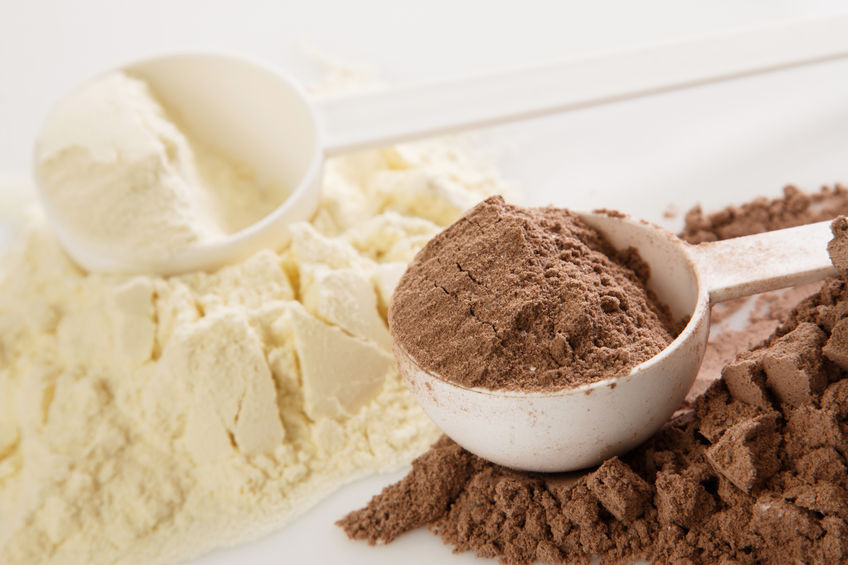Many people believe that a healthy diet includes drinking protein shakes. But are there risks getting so much protein from shakes? A new study indicates that people looking to bulk up may want to reconsider drinking on protein shakes.
New research from the University of Sydney suggests that protein shakes may lead to weight gain, depression and shorter life spans.
Scientists involved with the study
say the branched-chain amino acids found in many protein powders can stay in
the bloodstream and disrupt serotonin production in the brain.
Serotonin not only helps to regulate moods, but also helps control appetite.
Avoid Protein Shakes for a Healthy Diet
University of Sydney researchers have examined whether there are any ongoing ramifications or potential side-effects from long-term high protein intake or from consuming certain types of amino acids.
Amino acids have long been touted by the fitness and bodybuilding communities
for their muscle building benefits. From ultra-bulk protein powders to lean
mass-promoting snack bars, there’s no shortage of products available for those
seeking a muscle boost.
However, protein’s popularity has also meant that less attention has been paid to researching its potentially negative side-effects.
New research from the University of Sydney’s Charles Perkins Centre, Professor Stephen Simpson and Dr Samantha Solon-Biet, suggests that while delivering muscle-building benefits, excessive consumption of branched-chain amino acids (BCAAs) may reduce lifespan, negatively impact mood and lead to weight gain.
Dr Solon-Biet’s research has investigated the complex role nutrition plays in mediating various aspects of metabolic health, reproduction, appetite and ageing:
“While diets high in protein and low in carbohydrates were shown to be beneficial for reproductive function, they had detrimental effects for health in mid-late life, and also led to a shortened lifespan. What this new research has shown is that amino acid balance is important – it’s best to vary sources of protein to ensure you’re getting the best amino acid balance.”
BCAAs Can Influence Mood and Lead to Overeating
Using instruments at the University’s core research facility, Sydney Imaging, the researchers examined the impacts that dietary BCAAs and other essential amino acids, such as tryptophan, had on the health and body composition of mice.
- The test mice were given four different test doses of BCAAs during their lifespans.
- Some were fed 200% of the normal amount of BCAAs.
- Others were fed the standard amount of 100%.
- The third group was fed 50% of the norm.
- And the final group received 20% for life.
- The research showed that the mice that were fed 200% BCAAs increased their food intake, resulting in obesity and a shortened lifespan.
According the Academic Director of the Charles Perkins Centre’s and researcher from the School of Life and Environmental Sciences Professor Stephen Simpson:
- Supplementation of BCAAs resulted in high levels of BCAAs in the blood which competed with tryptophan for transport into the brain.
- Tryptophan is the sole precursor for the hormone serotonin, which is often called the ‘happiness chemical’ for its mood-enhancing effects and its role in promoting sleep.
- Lowered serotonin levels in the brain provides a potent signal to increase appetite.
- The serotonin decrease caused by excess BCAA intake led to massive overeating in our mice, which became hugely obese and lived shorter lives.
For a Healthy Diet Increase Get Protein for a Variety of Foods
Dr Rosilene Ribeiro, public health nutritionist from the University of Sydney’s School of Life and Environmental Sciences, recommends eating a wide-range of proteins.
It’s important to vary protein sources in order to get a variety of essential amino acids, through a healthy and balanced diet rich in fiber, vitamins and minerals.
- BCAAs are essential amino acids present in protein-containing foods, with red meat and dairy being the richest sources.
- Chicken, fish and eggs are also nutritious sources of BCAAs.
- Vegetarians can find BCAAs in beans, lentils, nuts and soy proteins.
- Foods rich in tryptophan include seeds and nuts, soy beans, cheese, chicken, turkey and interestingly, crocodile.
Click here to read the full article about avoiding protein shakes for a healthy diet.






